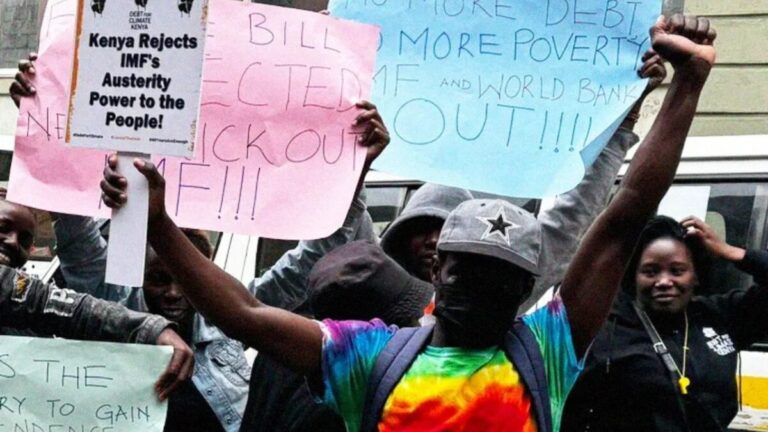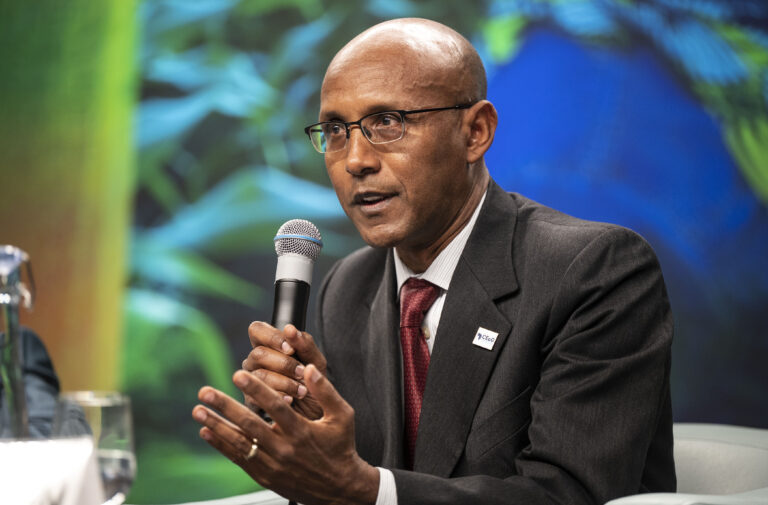
Government Spokesperson Isaac Mwaura (left in cap) chats with inABLE Founder and Executive Director, Irene Mbari-Kirika on 3 June, 2025 during the official opening of the 6th Inclusive Africa Conference in Nairobi. Photo/Newsflash
By Newsflash Reporter
Nairobi, Kenya – June 4, 2025 — The sixth Inclusive Africa Conference marked Global Assistive Technologies (AT) Day with a vibrant celebration that underscored Africa’s leadership in accessible technology.
Held in Nairobi, the event brought together innovators, policymakers, entrepreneurs, and disability advocates from across the continent to explore how technology can empower people with disabilities and drive inclusive economic growth.
In her keynote address, Maxine Williams, Vice President of Accessibility and Engagement at Meta, lauded Kenya’s role as a digital innovation hub. She emphasized that accessibility should be seen not just as a moral obligation but also as an economic opportunity.
“When we build with accessibility in mind, we unlock opportunity. We invest in people, and people build economies,” said Williams, calling for inclusion to be embedded in the design and development of digital tools from the start.
With over 1.3 billion people—one in six globally—living with disabilities, the conference highlighted the glaring digital divide that still exists. Many people with disabilities remain excluded from essential services due to inaccessible technology and infrastructure. Williams pointed out that innovations in AI are beginning to change that, particularly in Africa.
Meta’s open-source tools, including Llama and Massively Multilingual Speech (MMS), are driving inclusion by supporting over 1,100 languages, including many African dialects that have historically been overlooked in global technology development.
Read more: Kenya to make all online gov’t services accessible for PWDs
Williams highlighted real-world examples where AI-powered assistive tools are making a tangible difference: Jacaranda Health’s maternal health assistant in Kenya, HelpMum’s vaccine chatbot in Nigeria, Twiga’s teaching assistant in Tanzania, and FoondaMate’s AI study companion used by millions of students in Sub-Saharan Africa.
On the Meta platforms themselves, the company is rolling out new features to improve accessibility. WhatsApp now offers voice message transcription, while Facebook and Instagram have improved screen reader compatibility and AI-generated alt text—features developed in close consultation with the disability community.
“Real accessibility happens when those most impacted help design the solutions,” Williams added.
Investing in innovation and inclusion
Nathalie Kouassi Akon, Global Director of Gender & Economic Inclusion at the International Finance Corporation (IFC), further emphasized the economic potential of assistive technologies. Sharing the story of Regina, a Nairobi entrepreneur with a disability whose life changed after accessing a smartphone through a fintech platform, Akon made a powerful case for greater inclusion.
Still, Akon cautioned that significant barriers remain, particularly in rural areas where nearly 80% of people with disabilities in Kenya lack access to even basic technology and financial services.

ICT Cabinet Secretary William Kabogo (left) engages with Mastercard Foundation’s Director of Strategic Partnerships & Innovation Dina Randrianasolo (onlooking). Photo/Newsflash
To help address this, she highlighted the MOSAIC initiative—launched in collaboration with ATscale—which aims to boost Africa’s local manufacturing of assistive technologies and build critical technical skills on the continent. With the global AT market projected to reach USD 60 billion by 2030, Akon noted that Africa is well-positioned to benefit from the growth—if adequate investments and policy support are provided.
She also celebrated ongoing efforts to create 500,000 jobs for young people with disabilities, calling for stronger partnerships between governments, the private sector, and civil society to support inclusive innovation and the responsible use of artificial intelligence.
Read more:CGIAR launches Asia Digital Hub at WorldFish to drive AI
The Global Assistive Technologies Day, marked annually on June 4, aims to raise awareness about the transformative power of assistive technologies—from screen readers and mobility devices to AI-driven tools. These technologies are essential in enabling people with disabilities to live independently, pursue education, and gain meaningful employment.
However, access remains a major challenge—only one in ten people globally has access to the AT they need. This year’s celebration served as both a call to action and a recognition of Africa’s growing role in closing this gap through innovation and collaboration.
As Nairobi hosted this year’s Global AT Day observance, it became clear that Africa is not just participating in the conversation about accessibility—it is leading it.




2 thoughts on “Africa leads way as Nairobi hosts Global Assistive Tech Day”
Comments are closed.